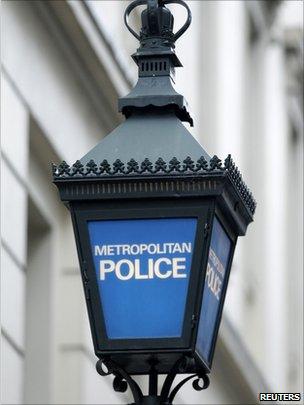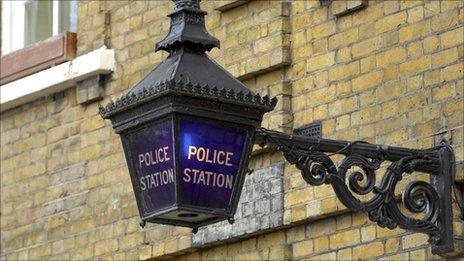Police bail in the dock
- Published
- comments

It is bizarre that it took a legal advisor in Salford to spot 25 years of apparently unlawful police procedure.
A system crawling with ambitious lawyers eager to exploit any legislative loophole had failed to notice a giant chasm.
Now, we are told, external, custody sergeants in England and Wales are running around like "headless chickens", the criminal justice system is in "disarray" and we face the prospect of thousands of murderers, rapists and armed robbers walking free. (We don't.)
There has been some pretty hysterical reporting of the Hookway case, external and its implications so it is worth stepping back to consider how big a problem the ruling really creates for law enforcement and to ask whether, actually, the fall-out from this might be more efficient policing and greater justice.
Consider the case of four women peace protesters arrested in February last year for obstructing a highway following a day of action at the atomic weapons establishment at Aldermaston.
Police didn't have enough evidence to charge them with any offence, so they released them on bail pending further enquiries. But the bail included strict conditions as to where they could go, including a ruling that they couldn't join their friends on the peace camp at the Trident factory.
Now, whatever you might think of the protest, we are talking here about four women against whom the police do not have sufficient evidence of a crime having been committed to charge them. For two months their liberty was restricted while detectives apparently searched for clues and found none.
Eventually, in April, the protesters went to a magistrate's court to complain that the police's restrictions were unjust. District Judge Crabtree threw out most of the restrictions as unnecessary and disproportionate and the women were able to rejoin their friends at the camp.
A month after that, the women were convicted of obstruction and given a conditional discharge. The prosecution was instructed to pay its own costs.
Decision pressure
The case highlights a concern that police bail is an incentive to do nothing: why bother rushing around to find new evidence when curfew or movement restrictions keep suspects exactly where detectives want them?
Some lawyers even suggest that police use the bail restrictions as a form of non-judicial "punishment" against individuals they don't trust.
Home Secretary Theresa May: "This is a matter of great concern"
The Police and Criminal Evidence Act, external is designed to ensure that officers don't abuse their powers.
Investigators can detain someone for questioning for a maximum of 96 hours before they must produce new evidence, charge them or let them go.
However, until now, it had been thought that 96 hours could be spread over time.
Suspect Sam could be grilled for a couple of hours and then released on police bail, hauled back in for another session if detectives suddenly thought of some new questions and released again - a process that might extend over weeks or even months.
It has been the standard approach for decades but now a High Court judge has interpreted the legislation as saying that once four days have passed, including the period on bail, detectives must have new evidence (key phrase) before they can force Suspect Sam back to the station.
This clearly limits officers' room for manoeuvre but it does not mean the untimely death of police bail nor does it mean villains walk free.
What is does do is put far greater pressure on detectives to put up or shut up.
They cannot sit on their hands knowing that Suspect Sam is on the end of a string.
Cuts to CID have made it more difficult for officers to deal expeditiously with the early stages of an investigation and the ruling, in the short term, will put additional pressure on the Crown Prosecution Service to come to quick decisions.
Swift moves
The key to the import of the new ruling is the definition of 'new evidence'. According to the police's own legal advice, there is no case law which can be used to assist in the definition of the word "new" but they reckon it means additional evidence that would impact on the investigation of the case and which makes arrest necessary.
"For instance, statements from witnesses, CCTV evidence, results of intelligence checks or forensic tests etc may all be considered as providing new evidence justifying the re-arrest provided arrest is necessary because of that new evidence."
This strikes me as a pretty wide definition and covers pretty much everything that one imagines detectives might be gathering if they were serious about moving swiftly to a charge or release.
It doesn't prevent custody sergeants bailing suspects, sometimes on strict conditions, for weeks or months.
It doesn't force detectives to charge or release someone within four days. It simply means that they can't haul Suspect Sam back for another grilling unless they've got genuinely new stuff to talk to him about.
Let's be clear: we are talking about individuals against whom police do not have enough evidence to get prosecutors to agree to pursuing a charge.
If they get enough, they can arrest them and charge them. If they are worried about a suspect fleeing, they can impose restrictions which, if breached, could result in the individual being locked up.
It seems likely that Parliament will be asked to rush through legislation so that the law does what police thought it did. But it also offers an opportunity for a public debate about the use of police bail and how we might encourage speedy and just processes.
- Published30 June 2011
